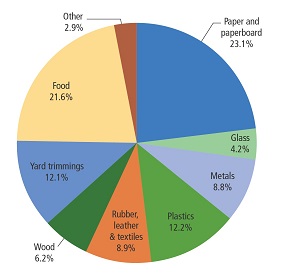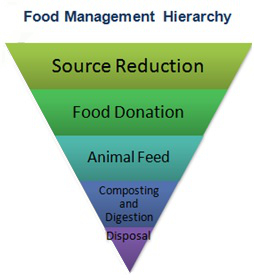 In 2018, compostable materials such as food scraps and yard trimmings make up nearly 34% of all municipal solid waste generated in the U.S. (see pie chart). Instead of disposing of this material in landfills and incinerators, composting uses organic material to create a valuable product with environmental and economic benefits, including greenhouse gas emissions reductions and green jobs.
In 2018, compostable materials such as food scraps and yard trimmings make up nearly 34% of all municipal solid waste generated in the U.S. (see pie chart). Instead of disposing of this material in landfills and incinerators, composting uses organic material to create a valuable product with environmental and economic benefits, including greenhouse gas emissions reductions and green jobs.
Recycling of some organic materials, such as yard trimmings and manure, is widespread in Maryland. One area of growing interest is food scraps diversion. Though only an estimated 15.5% of food scraps was recycled in Maryland in 2019, much of the remaining material could be prevented, used to feed humans or animals, or composted.
For additional information on Food Scraps Management in Maryland visit the Department's
Food Scraps Management web page.
Announcements
House Bill 171 – Department of the Environment – Yard Waste, Food Residuals, and Other Organic Materials Diversion and Infrastructure – Study
Details on HB 171 and the Study Group are available on the
House Bill 171 - Organic Materials Diversion and Infrastructure web page.
Composting Facility Permits
The Maryland Department of the Environment (the Department) has published a final General Composting Facility Permit (GCFP) as provided under Environment Article, §9-1725, Annotated Code of Maryland, and Code of Maryland Regulations (COMAR) 26.04.11.11.
Certain water related permits may be applicable to a composting facility. See the
Contacts section below, for groundwater and stormwater discharge contact information.
Composting Facilities
To date, the Department has issued 23 composting permits. As a result of the reviews, the Department has issued 18 certificates for coverage under the General Permit, modified 4 landfill refuse disposal permits to include composting, and issued 1 Individual Composting Facility Permit.
Currently, out of 23 facilities, 21 facilities are operating. Out of the 21 facilities, 14 compost only yard trimmings, 6 compost a combination of food scraps, yard trimmings, manure etc., and 1 composts hay, straw, and manure.
Composting Facility Regulations Adopted (COMAR 26.04.11)
On June 12, 2015, a Notice of Final Action was published adopting new composting facility regulations effective July 1, 2015. The Final Action adopted the regulations as proposed in December 2014, with several minor nonsubstantive changes. The changes are listed in the Notice of Final Action.
County Food Scraps Collection Programs
Fact Sheets
Resources
The following are collections of organics diversion resources targeted to various audiences. These resources can help you start an organics diversion program at work, school, or home, or simply learn more about compost and its use. 
Other Information
Legislation and Reports
Contacts